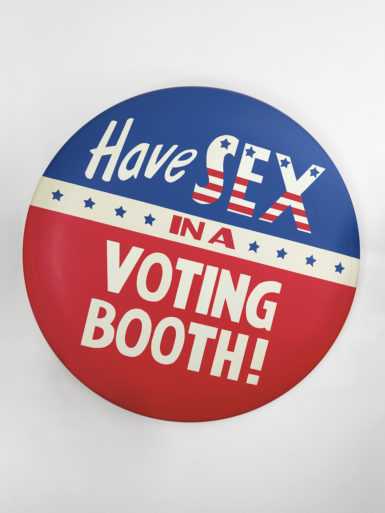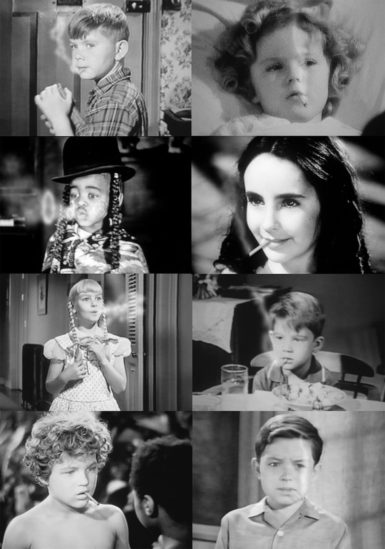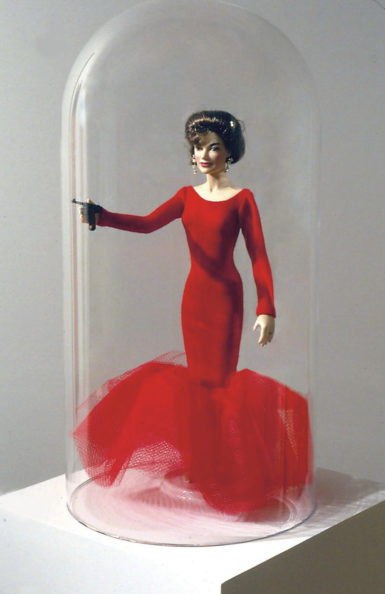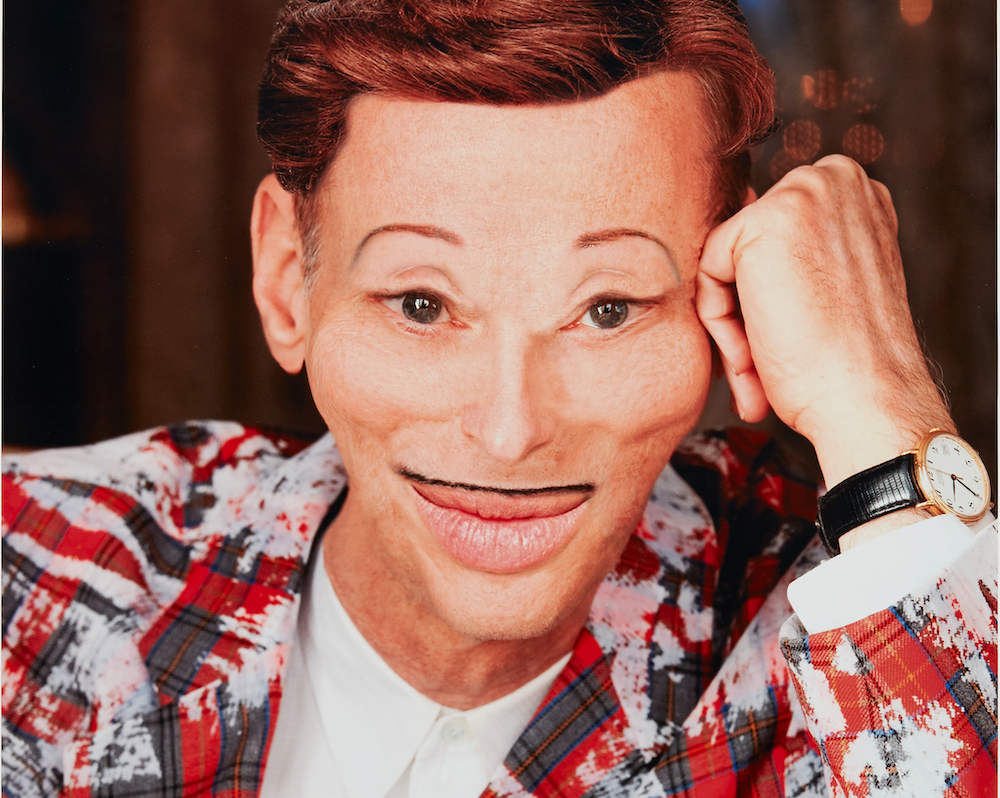[ad_1]

John Waters, Beverly Hills John, 2012. Rubell Family Collection, Miami.
© JOHN WATERS, COURTESY MARIANNE BOESKY GALLERY
Now 72, John Waters, Baltimore, Maryland’s golden son, long ago earned his place as one of the greatest living multi-media satirists, having spent his career challenging conventions, prejudices, assumptions, and taste with his wit, wisdom, and joie de vivre. His first retrospective, “Indecent Exposure,” which is on view at the Baltimore Museum of Art through January 6, 2019, shows the vast scope and depth of his insights into culture, politics, and humanity. It features 160 works, including mock-ups of tabloid newspapers skewering literary luminaries, vintage pornographic paperbacks, and a touching snapshot of himself with Andy Warhol in Manhattan next to a replica of a Miró he bought at the BAM during his Baltimore boyhood. He has an autobiography scheduled for release next year, titled Mr. Know-it-all, but to borrow from Bethenny Frankel, Waters isn’t a “know-it-all”—he just knows it all, and he was happy to share while walking through his show one recent weekday afternoon.
Ana Finel Honigman: I decided to wear today all the items that I either bought because—or was told after—were John Waters-esque.
John Waters: When they say movies are John Waters-esque, I usually never like the movie. I know what they mean but . . . fashion is a different story. I understand. Divine would have worn that outfit.
AFH: Thank you? I got these shoes at an Alexander McQueen sample sale in London and I won a scuffle with another shopper because I said, “I need that. It’s very John Waters-esque.”
JW: Good! Good! Sample sales are vicious.
AFH: So, I love the show.
JW: Thank you.

John Waters, Campaign Button 2004. Private collection, New York.
© JOHN WATERS, COURTESY MARIANNE BOESKY GALLERY. PHOTOGRAPHY BY ELISABETH BERNSTEIN
AFH: No, thank you! It feels really appropriate for now. It feels really necessary.
JW: Some of the things take on such a different meaning, because “Have sex in a voting booth” was not made in the Trump era. And “Ed Sullivan raped me,” that was a real headline in The Enquirer. I thought that was almost funny at the time because I thought, “Oh, come on!” but now I look back on it, and I’m sure it was true. It was pre-#MeToo. What a horror that would be. Imagine having Ed Sullivan coming at you.
AFH: And we know way more about the National Enquirer now than anyone would want to know. Can you believe that we’re in a world where the Enquirer plays a part in the presidency?
JW: They’ve been around forever. I still get it. It’s not as good anymore. Those days are over. I have a bunch of real headlines in the show. “I am not gay,” by Tom Cruise, was a real headline. A bunch of the others were ones I made up. And the National Brainiac, that’s what I really wish I could edit. Imagine me being the editor of a tabloid for intellectuals. Imagining hiding outside their apartments for bathing-suit pictures of Philip Roth.
AFH: It does seem nice being a disembodied brain.
JW: But you need to do it all the time. That’s what I am. I am a storyteller. I am a writer. I think up all the art before I do it. You read them left-to-right, like a sentence. I write all my own books. It’s all about writing, or actually editing.
AFH: Do you think of yourself as a political person?
JW: Yes! I think all I do is political but I’d never say that! I would never put Trump in an art piece because that dates it, immediately. I see a lot of shows that have Trump stuff in it, and I think “meh.”

Installation view of “John Waters: Indecent Exposure” at the Baltimore Museum of Art, 2018.
COURTESY BALTIMORE MUSEUM OF ART
AFH: It’s not dated but it is timely. What is the story of “Have sex in a voting booth”?
JW: Someone told me that two people can go into a bathroom stall and one person steps into shopping bags, so it looks like just one person in the stall, and then they have sex. I thought, when they had the old-fashioned ones, “Why not do that in a voting booth?”
AFH: Definitely more fun than reading and re-reading and re-re-reading the propositions about allocating funds to understand who gets what and why. I’d like to know which great mind discovered sex in a voting booth. It must be fun being a great mind—like the intellectuals you pap in your National Brainiac magazine.
JW: But no one writes [about] when they get fat.
AFH: Well, presence matters. There is more lookism for intellectual rock stars than we want to admit. There is a trend for gorgeous books celebrating the fashion of great minds. David Foster Wallace’s bandanas, Susan Sontag’s turtlenecks, Simone de Beauvoir’s scarves . . . no one was chicer than Joan Didion. There is a great photo in a new book of Jacqueline Susann in a safari pantsuit with the best fluffy black poodle.
JW: But there is no one standing outside their apartments with telephoto lens, trying to [get] bathing-suit paps . . .

John Waters, Children Who Smoke, 2009. Collection of Jack Tantleff.
© JOHN WATERS, COURTESY MARIANNE BOESKY GALLERY
AFH: Do you think the days of celebrity stalking are over? We are quickly progressing into a much more empathetic, openminded, diverse culture with body-positivity and advocacy for mental-health issues. Maybe the Heat mag treatment will start looking like medieval torture devices to millennials.
JW: I don’t know about that . . . in some circles, perhaps. The tabloids can’t say “the fattest person,” but they still say “worst beach bodies.”
AFH: That’s like the brilliant British “tired and emotional.” They don’t say “blind drunk” in the British tabloids. Instead they say, “She was spotted leaving the Groucho Club looking tired and emotional.”
JW: You can sue someone [for] saying you’re drunk [or have] health issues. Those are the two where you can really sue. Carol Burnett sued when they said she was drunk, because it can hurt career prospects. It can ruin a livelihood. I remember with AIDS it was terrible. People would find out before they got their own test results. I think that happened to Tony Perkins. Someone on the hospital staff leaked for money. You forget how ruthless they were about AIDS.
AFH: Stigma and shame are the most deadly and terrible diseases. I don’t think we can say enough about the social and governmental abuses during the AIDS crisis here, in the West, or about the protests. AIDS activists created the template for protest.
JW: They were great. I say a lot about that in my new book. ACT-UP was great. And lesbians saved us. Lesbians don’t get enough credit—they weren’t dying of AIDS but they saved us. They fought the most in the second tier, with Larry Kramer, about getting the new drugs out before they were tested. They didn’t have to, but they went to war for us. Gay men should remember that, but they don’t.
AFH: Not at all! It’s really good to recognize that, although lesbians were not dying at the same rate, their contribution was instrumental. But I return to my question—whether we are moving into a culture where public shaming of celebrities is shunned.
JW: There was an interview once with a tabloid editor where he was asked, “Why do you always write about celebrities failing?” He said, “Because our readers are failing.”

John Waters, Jackie Copies Divine’s Look, 2001. Collection of James Mounger, New Orleans.
© JOHN WATERS, COURTESY MARIANNE BOESKY GALLERY
AFH: Isn’t that celebrities’ purpose?
JW: Yes, but at least he was honest about it.
AFH: Well, they’re our morality tales. They’re our Greek gods and goddesses. Imagine the tabloid headlines for Hera and Zeus. They’d be endless.
JW: You don’t want them taking themselves too seriously to believe they’re actually our gods.
AFH: For the transgression themes, the Mike Kelley memorial in the show was a pure poignant moment. Why was that in the room dedicated to sexual transgression?
JW: Death and suicide are still taboos. I never think it’s an appropriate choice, unless you have medical issues, but it’s a choice he made. Well, I was a speaker at his funeral and it was his choice. It wasn’t a cry for help. He succeeded. I think he’s the only person I know who committed suicide because he was too successful. What is left to be a bad boy TKabout when you have an unlimited budget at Gagosian?
AFH: The toxicity of fame is a main theme in the show, if you count the slower suicides of celebrities whose addictions were enabled by their successes. You have Michael Jackson, Anna Nicole Smith, Whitney Houston, Amy Winehouse . . .
JW: I have “She should have said no,” which is the title of a work of women who should have said “no” for some reason. Different reasons but same thing.
AFH: But are they different? Isn’t it all just poisoned love? That work has Amy Winehouse, Whitney House, Princess Di . . .
JW: She should have said “no” to being a princess.
AFH: Sure, but we forget that she had no education. Princess Di was raised like a veal. I love today’s royals because of how much they’ve clearly grown and learned. That was Diane. She was incredible, a true saint, but we forget the tragedies before her death.
JW: The movie She Should Have Said No, where I got the title, was about teen pregnancy. It was movie from the ‘50s.

John Waters, Shoulda!, 2014. Rubell Family Collection, Miami.
© JOHN WATERS, COURTESY MARIANNE BOESKY GALLERY
AFH: Toxic love.
JW: I have another called I Think I’m in Love, with two women screaming.
AFH: That was in the porno-themed room?
JW: It’s a part of it. When you’re in love, crazy sex has something to do with it too? Unless you never have it, and then go crazy from that.
AFH: Crazy is one consequence. What is the big bug in that room?
JW: That’s a pubic lice. Kids, these days, don’t have pubic hair. They have no idea what a crab is. Pubic lice are extinct.
AFH: I hate this shaving thing. I think people look like plucked chickens.
JW: Or adult babies. I’m not into it, at all.
AFH: What is the value of shock for you?
JW: I don’t shock to shock. Whenever people say something is John Waters-esque, it’s always because it’s shocking but I don’t just do that. I don’t think that I do. It needs to make you laugh or change how you think. Then, you can use shock. It’s easy to shock but making people laugh and think, that’s what I try to do.
[ad_2]
Source link

